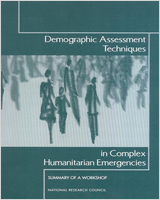NCBI Bookshelf. A service of the National Library of Medicine, National Institutes of Health.
National Research Council (US) Roundtable on the Demography of Forced Migration. Demographic Assessment Techniques in Complex Humanitarian Emergencies: Summary of a Workshop. Washington (DC): National Academies Press (US); 2002.

Demographic Assessment Techniques in Complex Humanitarian Emergencies: Summary of a Workshop.
Show detailsThe discussion at the workshop touched on just a few of the issues surrounding demographic estimation in complex humanitarian emergencies. In the past, there has been a dearth of research aiming to evaluate the use of various demographic methods in different types of emergencies. However, there are many issues that can be explored relatively easily, as long as methods are properly documented. Many of the workshop participants, in conjunction with their own institutes and universities, are pursuing further research on these topics, and new techniques will continue to develop over time. In the meantime, participants agreed that statisticians who work on sample surveys in stable settings could serve as valuable resources to those in the field doing rapid estimation surveys. Although several basic manuals already exist on estimation techniques for field workers,28 further elaboration of these methods and guidance on which method is best in a particular setting are important, needed resources. In addition, training on how to implement various methods for field workers is vital.
The human rights research field and the humanitarian relief field also have much to learn from one another. Human rights research techniques may be adaptable to crisis settings, and rapid estimation techniques may be useful for documenting human rights abuses in the early stages of an emergency. A recent conference in Mérida, Mexico, examined these issues, and the human rights community continues to work actively in this area of research.29
This workshop was the beginning of a dialogue between many different groups—humanitarian aid workers, epidemiologists, human rights researchers, demographers, sample survey statisticians, policy makers, and anthropologists. Further discussion can only help to increase their knowledge of these methods which may help to improve their response to emergencies and ultimately to their understanding of the root causes and consequences of crises.
Footnotes
28 For example, Médecins Sans Frontières 1997 and Perrin 1996.
29 The International Seminar on Statistics and Indicators in Human Rights was held in Mérida, Mexico, April 3-5, 2002.
- SUMMARY AND FINAL DISCUSSION - Demographic Assessment Techniques in Complex Huma...SUMMARY AND FINAL DISCUSSION - Demographic Assessment Techniques in Complex Humanitarian Emergencies
- Nardia scalaris clone 5 pentatricopeptide repeat protein (PPR) gene, partial cdsNardia scalaris clone 5 pentatricopeptide repeat protein (PPR) gene, partial cdsgi|190612760|gb|EU495509.1|Nucleotide
Your browsing activity is empty.
Activity recording is turned off.
See more...